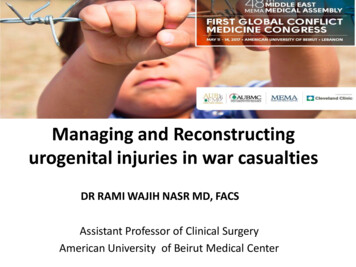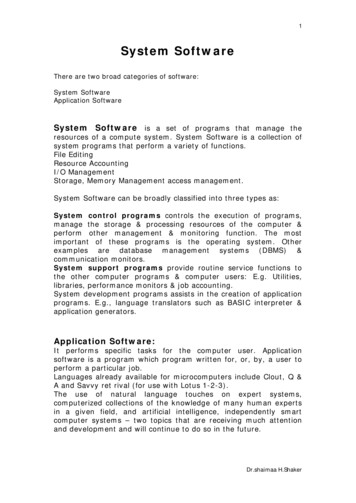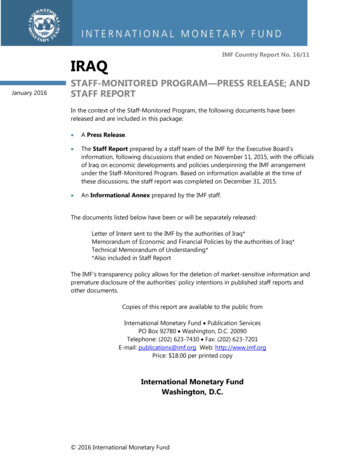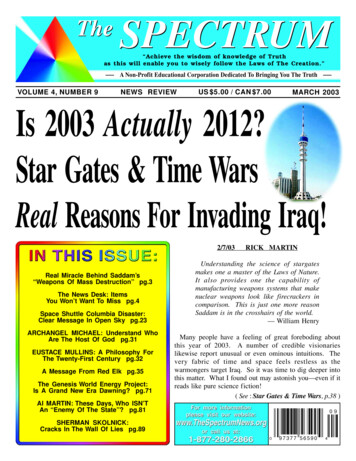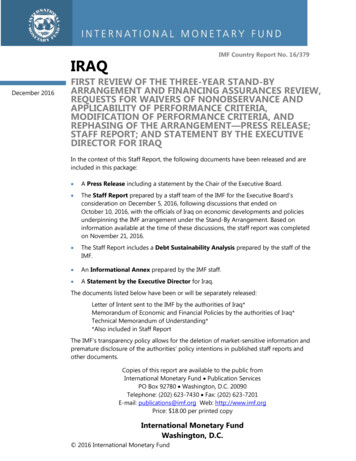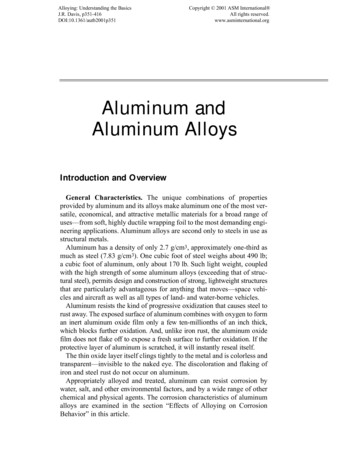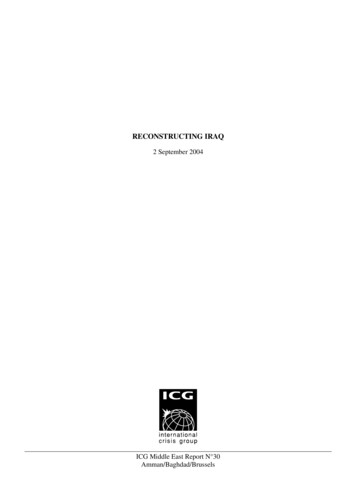
Transcription
RECONSTRUCTING IRAQ2 September 2004ICG Middle East Report N 30Amman/Baghdad/Brussels
TABLE OF CONTENTSEXECUTIVE SUMMARY AND RECOMMENDATIONS. iTHE BALANCE SHEET . 1I.A.B.II.CONSUMPTION BUT LITTLE RECONSTRUCTION .1THE IMPACT OF VIOLENCE .3WHAT WENT WRONG? . 4A.B.C.D.E.F.RECONSTRUCTING WITHOUT A PLAN.4RECONSTRUCTING WITH AN IDEOLOGY .6CPA DYSFUNCTION .9SHIFTING DEADLINES.10REBUILDING FOR OR BY IRAQIS? .111.Consultation and capacity-building .112.The private sector .13CHALLENGES AHEAD .15III. THE PROBLEM OF UNEMPLOYMENT. 16A.B.EMPLOYMENT AND PUBLIC WORKS .16JOB CREATION .18IV. CORRUPTION AND LACK OF TRANSPARENCY . 20A.B.C.D.V.ALLEGATIONS AND PERCEPTIONS .20ON FERTILE GROUND .21SETTING A BAD EXAMPLE.22TACKLING CORRUPTION .23INTERNATIONAL ASSISTANCE . 24A.B.SECURITY, IRAQI SCEPTICISM AND DONOR COORDINATION .24DEALING WITH SADDAM'S FINANCIAL LEGACY .26VI. CONCLUSION . 28APPENDICESA.B.C.D.MAP OF IRAQ .29ABOUT THE INTERNATIONAL CRISIS GROUP .30ICG REPORTS AND BRIEFINGS ON THE MIDDLE EAST AND NORTH AFRICA.31ICG BOARD MEMBERS .33
ICG Middle East Report N 302 September 2004RECONSTRUCTING IRAQEXECUTIVE SUMMARY AND RECOMMENDATIONSAmid political instability and violence, Iraq's economicproblems have been viewed as secondary andunrelated. They are not. U.S. and Iraqi institutionshave systematically lost and the insurgency gainedmomentum as living conditions failed to improve.Economic hardship and violence (political andcriminal) feed on each other: heightened populardissatisfaction and unemployment swell insurgentranks and the growing insurgency further hampersdevelopment. Without genuine reconstruction and asustained recovery plan, any political success will beshort-lived. Coalition Provisional Authority (CPA)performance fell far short of expectations and needsand offers a fragile, dysfunctional legacy on which tobuild. The Interim Iraqi Government, its still-to-comeelected successor, and the international communitycan ill afford to repeat its mistakes.Lack of security has been important and willcontinue to hinder economic activity. Kidnappings,assassinations and travel restrictions discouragedreconstruction and investment and led many nonIraqis to withdraw. Attacks on oil facilities furtherdisrupted the economy. Assessments of what wentwrong also must recognise the difficulties ofrebuilding an economy ravaged by Baathist misrule,war, and sanctions.But obstacles have not been of a security nature aloneor wholly due to the Baathist legacy. The CPA madea hard job harder. For the most part, the occupationforces came without a plan. What strategy they hadbenefited from little if any Iraqi input, was heavilyshaped by ideology and repeatedly subject toWashington's political deadlines. CPA plans forcomplete economic overhaul quickly encounteredstiff opposition by Iraqis intent on their own longterm strategy; shifting course, the CPA took ad hocdecisions, leaving unresolved crucial policy questionsfor fear of triggering even greater discontent. Thus, itwas originally fixated on large-scale privatisation but,facing Iraqi hostility, neither privatised norrelinquished the objective. As a result, it failed todevise an alternative approach that might haverevived ailing state companies so they could be usedto find temporary jobs for the unemployed.The 15 November 2003 turnaround accelerating thetransfer of sovereignty led officials to readjust plansabruptly and emphasise projects they could complete,without regard to how they fitted an overallreconstruction strategy or whether they addressedIraqis' immediate needs. U.S. bureaucratic infightingand high staff turnover and inexperience added to theobstacles. Inadequate transparency and accountabilityin the contracting process combined with real oralleged corruption has fed distrust of both occupationauthorities and Iraqi institutions.The point of listing failings is to learn from them. Asovereign Interim Government and eventually anelected one may be better positioned to correctmissteps; more legitimate institutions may be betterable to address everyday needs. But even if theprocess is smooth and viewed as credible by Iraqis-- a considerable "if" -- this will be a partial answer.Many issues that vexed the CPA remain. TheInterim Government, for example, will be reluctantto make broad economic changes lest it be accusedof usurping an elected government's prerogatives.As Lebanon's precedent shows, allocating powerand positions along ethnic/sectarian lines risksencouraging a parallel apportionment of public jobsand resources, with corruption and malfeasance asby-products. Nor have the occupation authoritiestruly disappeared: the U.S. remains powerful and,importantly, controls most reconstruction funds.The Interim Government's fundamental challengewill be to devise a coherent reconstruction strategy
Reconstructing IraqICG Middle East Report N 30, 2 September 2004Page ii(a) requiring foreign investors to help Iraqifirms, for example, by mandatingcontracting to them and hiring of Iraqilabour to the extent possible, as well ason-the-job training programs; andthat focuses on immediate material improvement andsets the stage for longer-term sound rebuilding whileavoiding a socio-economic crisis and its attendantpolitical implications. This means protecting andcreating jobs; far greater involvement by Iraqis -including civil society, local councils, trade unionsand associations -- at the local level; and structuralsteps (such as decentralisation, and a strengthened,independent media and judiciary) to curtail corruption.The international community's full and swift helpis needed. Increased assistance will not suffice;aid institutions, particularly those carrying outreconstruction projects on behalf of the U.S.government, should reconsider their approach. Projectdriven, externally designed aid is not the answer.Instead, the international community should workwith Iraqi institutions to design a comprehensiveeconomic development plan that seeks citizen input,emphasises decentralisation, job creation andalleviation of socio-economic distress, and includes apowerful transparency and anti-corruption component.(b) reviewing corporate taxes on foreigninvestment, raising them as Iraq's economicattractiveness increases.4.Improve government transparency andaccountability and ensure full access to economicand financial data, including by use of oilmetering equipment to monitor oil revenues andby providing regular updates on revenues andexpenditures of the Development Fund for Iraq.5.Address immediate socio-economic needs by:(a) designing projects with a visible, directimpact and significant employmentpotential, such as street cleaning, garbagecollection, sewage systems repair and localbyroads repair;(b) retraining former members of the Iraqiarmed forces and employing them in stateowned enterprises;Giving Iraq a real chance to recover also requires aclean break with the financial legacy of the Baathistregime -- not full and total repudiation, but a significantwrite-off of debt and war reparations obligationsthrough a smart combination of moratoriums, debtreduction, and preferential treatment of creditors inreconstruction projects.(c) offering credit facilities for housingconstruction and repair;(d) providing farmers withagricultural inputs; and(e) generally consulting with Iraqis, in particularassociations, labour unions, and groupsrepresenting the unemployed, on the designand implementation of projects.RECOMMENDATIONSTo the Iraqi Interim Government and FutureElected Government:1.Produce, in cooperation with the donorcommunity, a comprehensive plan forreconstruction, including:6.Give preferential treatment to Iraqi companies inthe procurement of goods intended for the foodrationing system.7.Initiate a debate on oil revenue management,using lessons learned from other oil-producingcountries and Iraq's own past and, in particular,establish a special fund insulated from thenational budget and day-to-day politicaldecisions.8.Encourage foreign creditors and war reparationsclaimants to forego their demands in exchangefor preferential status in reconstruction projectprocurement and contracting.(a) a strategy for economic diversification thatgradually steers the country away from itsdependence on oil revenues;(b) active support for the industrial andagricultural sectors; and(c) postponed privatisation of state companiesuntil market conditions and institutionbuilding show considerable improvement.2.3.Support and restructure state-owned companies,including by providing them with resources forrepairs and investment.Support Iraq's private sector by:subsidisedTo the U.S. Government:9.Improve the performance of U.S. agencies byrecruiting staff with expertise in post-conflict
Reconstructing IraqICG Middle East Report N 30, 2 September 2004situations and encouraging them to serve in Iraqfor longer than six months.10. Increase Iraqi participation in U.S.-fundedreconstruction projects by consulting with Iraqidecision-makers and civil society groupsrepresenting a range of interest groups, includingwomen, at early planning stages, granting Iraqistate institutions implementation powers andbetter communicating reconstruction aims andplans.11. Emphasise development of the private sectorby ensuring that prime contractors subcontractto Iraqi companies to the extent possible andproviding support to small and medium sizedlocal companies.12. Require prime contractors and subcontractorsto employ Iraqi labour to the extent possible.To the Donor Community:13. Increase multilateral aid disbursement andimmediately deposit funds pledged forreconstruction with the UN/World Bank Trustfacility, attaching minimal earmarks andconditions.Page iii14. Address corruption by:(a) granting the Iraqi Supreme Audit Board aseat on the International Monitoring andAdvisory Board;(b) supporting independent Iraqi media to playa watchdog role; and(c) rigorously applying national anti-corruptionlegislation to foreign companies operatingin Iraq.To Iraq's Main Creditors and Official Claimantsof War Reparations:15. Agree to negotiate a major debt restructuring andreduction package, ensuring that any conditionsregarding economic reforms are adapted to Iraq'sfragile post-conflict conditions.16. Forego most claims for war damages filed bycorporations and governments, possibly inexchange for preferential status in stateprocurement and reconstruction project contracts.Amman/Baghdad/Brussels, 2 September 2004
ICG Middle East Report N 302 September 2004RECONSTRUCTING IRAQI.THE BALANCE SHEETthe Khabur border.5 In Karbala and Najaf, scores ofnew hotels catering to Shiite pilgrims have opened.6A.CONSUMPTION BUT LITTLERECONSTRUCTIONThe Coalition Provisional Authority (CPA) can takesome credit for this consumer-led growth. ItsSeptember 2003 decision to increase substantiallypublic sector wages benefited at least 1 millionemployees and their families.7 Anti-inflationarypolicies helped stabilise the Iraqi dinar and controlinflation at about 34 per cent for 2003 and slightlybelow 30 percent for the first two months of 2004.8Defying predictions of a dinar collapse, the CPAsuccessfully converted and unified the Iraqi currency.9According to numerous and varied indicators, Iraq'seconomic situation has improved substantially sincethe fall of the Baathist regime in April 2003. Karada,Baghdad's main shopping street, boasts a thrivingmarket in expensive consumer items, some of whichhad never before been available. Rising salaries andincomes enabled many Iraqis to repurchase householditems sold durin
10. Increase Iraqi participation in U.S.-funded reconstruction projects by consulting with Iraqi decision-makers and civil society groups representing a range of interest groups, including women, at early planning stages, granting Iraqi state institutions implementation powers and better communicating reconstruction aims and plans. 11. Emphasise development of the private sector
